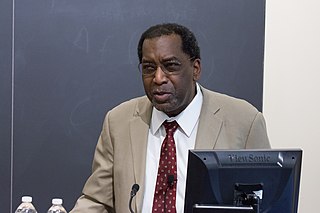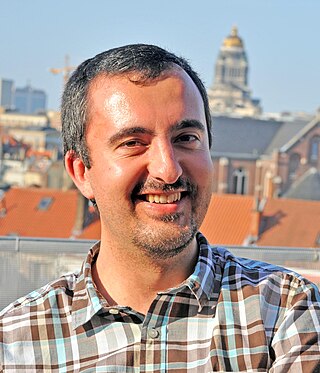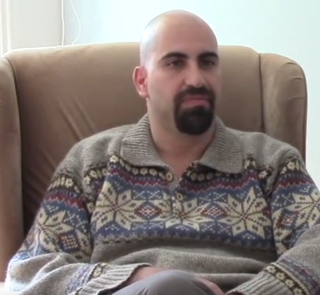Related Research Articles
Academic freedom is the right of a teacher to instruct and the right of a student to learn in an academic setting unhampered by outside interference. It may also include the right of academics to engage in social and political criticism.

Lee Carroll Bollinger is an American attorney and educator who served as the 19th president of Columbia University from 2002 to 2023 and as the 12th president of the University of Michigan from 1996 to 2002.

Hamid Dabashi is an Iranian-American professor of Iranian Studies and Comparative Literature at Columbia University in New York City.
Theodore C. Bestor was a professor of anthropology and Japanese studies at Harvard University. He was the president of the Association for Asian Studies in 2012. In 2018, he resigned as director from the Reischauer Institute following an investigation by Harvard officials that found he committed two counts of sexual misconduct.
Ellen Wolf Schrecker is an American professor emerita of American history at Yeshiva University. She has received the Frederick Ewen Academic Freedom Fellowship at the Tamiment Library at NYU. She is known primarily for her work in the history of McCarthyism. Historian Ronald Radosh has described her as "the dean of the anti-anti-Communist historians."
Don Jeffrey "Jeff" Meldrum is a Full Professor of Anatomy and Anthropology in the Department of Biological Sciences at Idaho State University. Meldrum is also adjunct professor in the Department of Physical and Occupational Therapy and the Department of Anthropology. Meldrum is an expert on foot morphology and locomotion in primates.

Robert David Johnson, also known as KC Johnson, is an American history professor at Brooklyn College and the Graduate Center of the City University of New York. He played a major role in reporting on the Duke University lacrosse rape case in 2006–2007. In 2007 he co-authored a book, Until Proven Innocent: Political Correctness and the Shameful Injustice of the Duke Lacrosse Rape Case.

Charles M. Payne Jr. is an American academic whose areas of study include civil rights activism, urban education reform, social inequality, and modern African-American history. He was the Chief Education Officer for Chicago Public Schools and used to be the Frank P. Hixon Distinguished Service Professor at the University of Chicago's School of Social Service Administration.

Mamadou Diouf is the Leitner Family Professor of African Studies, the Director of Institute for African Studies, and a professor of Western African history at Columbia University.

Harry Thomas Edwards is an American lawyer and jurist serving as a senior United States circuit judge of the United States Court of Appeals for the District of Columbia Circuit. He is also a professor of law at the New York University School of Law. Edwards was appointed to the D.C. Circuit in 1980 by President Jimmy Carter and served as its chief judge from 1994 to 2001. He assumed senior status in 2005.

Free Speech, "The People's Darling Privilege": Struggles for Freedom of Expression in American History is a non-fiction book about the history of freedom of speech in the United States, written by Michael Kent Curtis and published in 2000 by Duke University Press. The book discusses the evolution of free speech in the U.S. within the context of actions of individuals and how they affected change. The author writes that protests and actions by citizens helped to evolve the notions surrounding free speech in the U.S. before definitive statements on the matter from U.S. courts. Curtis writes that free speech rights were first developed in "the forum of public opinion," and that, "The history of free speech shows the need for broadly protective free speech rules applied generally and equally."
Elizabeth Mertz is a linguistic and legal anthropologist who is also a law professor at the University of Wisconsin Law School, where she teaches family law courses. She has been on the research faculty of the American Bar Foundation since 1989. She has a PhD in Anthropology from Duke University and a JD from Northwestern University. Her early research focused on language, identity and politics in Cape Breton, Nova Scotia, and her dissertation dealt with language shift in Cape Breton Scottish Gaelic, drawing on semiotic anthropology.
Lee D. Baker is an American cultural anthropologist, author, and Duke University faculty member. He is the Mrs. A. Hehmeyer Professor of Cultural Anthropology, African & African-American Studies, and Sociology. He served as Duke's Dean of Academic Affairs and Associate Vice Provost from 2008 to 2016. He taught at Columbia University from 1997 to 2000. Baker has authored two books and more than sixty academic articles, reviews, and chapters related to cultural anthropology, among other fields.

Noel B. Salazar is a sociocultural anthropologist known for his transdisciplinary work on mobility and travel, the local-to-global nexus, discourses and imaginaries of 'Otherness', heritage, cultural brokering, cosmopolitanism and endurance.
Ainslie Thomas Embree was a Canadian Indologist and historian. He was considered a leading scholar of modern Indian history and played a seminal role in the introduction of South Asian studies into US college and secondary education curricula. In addition to his academic work, Embree made significant contributions to peace efforts between India and Pakistan as a member of the Kashmir Study Group and the Council on Foreign Relations, and acted as a consultant to the US diplomatic and intelligence communities. He has been described as a "tireless advocate for greater understanding between the US and India" who was also known for his seminal insights into the complex relationship of religion and nationalism that have influenced religious scholarship in this country.
The current campaign for an academic boycott of Israel was launched in April 2004 by the Palestinian Campaign for the Academic and Cultural Boycott of Israel (PACBI) as part of the Boycott, Divestment and Sanctions (BDS) campaign. The campaign calls for BDS activities against Israel to put international pressure on Israel, in this case against Israeli academic institutions, all of which are said by PACBI to be implicated in the perpetuation of Israeli occupation, in order to achieve BDS goals. Since then, proposals for academic boycotts of particular Israeli universities and academics have been made by academics and organisations in Palestine, the United States, the United Kingdom, and other countries. The goal of the proposed academic boycotts is to isolate Israel in order to force a change in Israel's policies towards the Palestinians, which proponents argue are discriminatory and oppressive, including oppressing the academic freedom of Palestinians.

Steven Salaita is an American scholar, author and public speaker. He became the center of a controversy when the University of Illinois did not hire him as a professor of American Indian Studies following objections to a series of tweets critical of Israel's bombardment of Gaza in 2014. He also experienced similar controversy during the hiring process at the American University of Beirut in 2016.
The Small Axe Project is an integrated publication undertaking devoted to Caribbean intellectual and artistic work, exercised over three platforms—Small Axe; sx salon, and sx visualities—each with a different structure, medium, and practice.

The Columbia Unbecoming controversy involved three professors at Columbia University in New York who some students and faculty thought were biased against Israel, with the main events taking place from 2002 to 2005. At the center of the controversy was Joseph Massad, a Palestinian assistant professor who led the class Palestinian and Israeli Politics and Societies and who described Israel as a racist, settler-colonial state. For years, he was allegedly dissented by students in his class who disagreed with him. Pundits called for Columbia to fire him as they saw him as unfit to teach.
Columbia University in New York City, New York, has seen numerous instances of student protests, particularly beginning in the late 20th century.
References
- ↑ "Nicholas De Genova | Comparative Cultural Studies Department | UH CLASS". www.uh.edu. Retrieved 2019-09-05.
- 1 2 www.nicholasdegenova.com
- ↑ Move: Mobility Research Swiss Chair of Mobility Studies: Nicholas De Genova.
- 1 2 "Free Speech / Academic Freedom / Nicholas De Genova". mysite. Retrieved 2019-09-05.
- ↑ Ron Howell, "Radicals Speak Out At Columbia ‘Teach-In,’" NewsDay, March 27, 2003.
- 1 2 The Most Hated Professor in America by Thomas Bartlett, April 18, 2003, Chronicle of Higher Education (reprinted here). (original article available here (subscription required)
- ↑ Professor calls for 'million more Mogadishus', CNN, March 28, 2003.
- ↑ Stir Continues Over Columbia Professor's Comments by Catherine Donaldson-Evans (contributions by Melanie Schuman), Fox News, April 2, 2003.
- 1 2 Professor Mogadishu by Matthew Continetti, National Review Online, March 31, 2003.
- ↑ At Columbia, Call for Death of U.S. Forces Is Denounced By Tamar Lewin, The New York Times, March 29, 2003.
- ↑ President Bollinger's Recent Statement on Assistant Professor De Genova's Comments by Lee Bollinger, Columbia News, (Columbia.edu), April 3, 2003.
- ↑ Mouthy professor should be fired by J.D. Hayworth, The Arizona Republic, April 14, 2003.
- 1 2 Hate Speech at Columbia is Academic by U.S. Congressman J.D. Hayworth, Center for Individual Freedom, April 10, 2003.
- ↑ University resists lawmakers' call to fire antiwar instructor by Phil Hirschkorn, CNN, April 8, 2003.
- ↑ Columbia Has Come To Stand For Terrorism, Genocide Archived 2016-03-03 at the Wayback Machine by Herb Denenberg, The Advocate (reprinted in The Bulletin), January 20, 2009.
- ↑ "Coalition Rallies For Gaza," Columbia Daily Spectator, Jan. 28, 2009
- ↑ Letter to the Editor by Nioolas De Genova, Columbia Spectator, March 27, 2003. (reprinted in The History News Network).
- ↑ De Genova, Nicholas (2014). Within and Against the Imperial University: Reflections on Crossing the Line. in The Imperial University: Academic Repression and Scholarly Dissent, edited by Piya Chatterjee and Sunaina Maira: University of Minnesota Press.
- ↑ www.nicholasdegenova.com